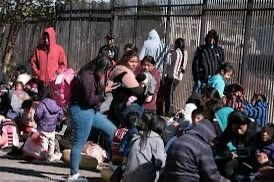The situation of African immigrants in the U.S. has become a significant issue in recent years, particularly due to the threat of mass deportation. These immigrants have built lives, established families, and contributed to their communities, but under the Trump administration’s hardline immigration policies, many face the constant fear of being sent back to their countries of origin.
For African immigrants living in the U.S., deportation has become an ever-present threat. One of the most controversial policies under the Trump administration was the plan to create a national registry for undocumented migrants over the age of 14. These individuals would be required to register, and failure to do so could result in criminal prosecution.
An example of the devastating consequences of such policies can be seen in the case of Anwar Mohamed, who was deported to Somalia in 2018 after being convicted of a felony. Having spent years in the U.S., built a family, and found stability, Anwar was suddenly forced to leave the only country he had come to see as home. His experience is not uniquemany African immigrants have faced similar shocks and struggles when deported.
The U.S. immigration system is incredibly complex, and many immigrants are not aware of their legal rights or how to navigate the bureaucratic hurdles. Akua Aboagye, a Ghanaian immigration attorney, plays a crucial role in helping families understand the intricacies of immigration law and ensuring that they can protect their right to remain in the country. She works to guide individuals through the legal challenges they face, offering support and expertise to those trying to stay in the U.S.
The threat of deportation goes beyond legal and economic challenges—it has significant social and psychological effects as well. For individuals like Anwar Mohamed, who have spent years building a life in the U.S., being forcibly deported is not just a legal issue; it is a traumatic experience that disrupts their sense of home and belonging. Deportation means losing their community, their work, and often their family.
Moreover, African immigrants often come from countries affected by conflict, poverty, and instability. Returning to these conditions can be a difficult and dangerous process. After spending years in the U.S., many deportees find themselves struggling to adapt to life in a country they may no longer recognize or where they have little to no support network.
The shifting immigration policies in the U.S. continue to create uncertainty for African immigrants. The question of how future administrations will approach immigration reform remains unclear. While the Trump administration implemented aggressive measures, the Biden administration has promised to take a more compassionate approach. However, the fear of future crackdowns still looms large for many.
Deportees like Muktar Ahmed share their personal stories of the challenges they faced after being sent back to their home countries. These experiences highlight the profound emotional toll of deportation and the struggle to rebuild lives after such a traumatic event. For many African immigrants, the experience of deportation is a harsh reminder of the precarious nature of their status in the U.S.
The threat of deportation is not just a legal issue for African immigrants in the U.S.; it is a deeply personal and emotional struggle. Many have built lives, families, and careers in the U.S. only to face the looming fear of being separated from everything they’ve worked for. Immigration attorneys, like Akua Aboagye, and community leaders play a vital role in helping these individuals navigate the complex system and defend their rights. The impact of these policies is felt not only through legal battles but also through the psychological and social consequences that come with the fear of losing one’s home and family.
Madina Mammadova\\EDnews










